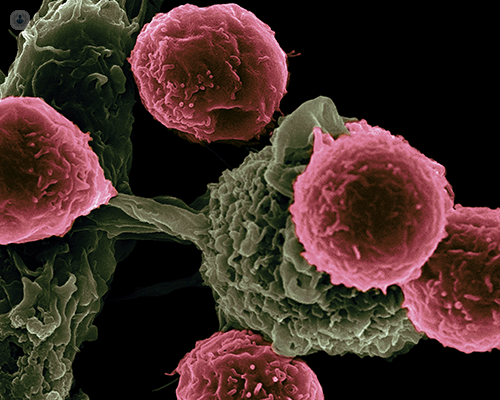How to take part in cancer clinical trials
Written in association with:Cancer clinical trials in patients with cancer usually aim to discover more effective cancer treatments. Dr Mark Tuthill, a leading medical oncologist from Oxford, explains what clinical trials are, how you can get involved in one for cancer treatment and how eligibility for a trial is determined.

What are clinical trials?
A clinical trial is a research study which usually seeks to determine whether a treatment is potentially suitable for a particular group of patients with cancer or to determine which treatment is best for a given condition.
A trial can involve drugs, surgery, radiotherapy and many other types of interventions. Often, the objective of a larger trial is to find out whether one treatment is better than the current options of care. Small trials tend to test new medicines in small groups of patients to determine if study treatment is beneficial to the trial participants.
What are the positive aspects of taking part in a clinical trial?
Taking part in a clinical trial may give you access to a treatment you otherwise wouldn’t be able to get. The positives of undergoing the trials are that you may get the opportunity to receive a treatment that is a future treatment for a condition and the study medicines could be more effective than standard treatments.
For example, immunotherapy trials may offer patients immunotherapy treatments after curative cancer surgery to see whether the curative treatment can prevent reoccurrence after the surgery.
What are the negative aspects of taking part in a clinical trial?
Not all clinical trials are successful, so it is possible that you might receive a treatment that was no better than the best-known treatment, or it could be worse. Research trials do usually involve more hospital visits than standard care and extra scans which can take up more time than standard visits.
Your research nurse and the team will of course do their best to reduce these extra visits and organise your tests to be done in a single visit to the hospital.
How is a patient monitored during a clinical trial to see if it is working?
If you are involved in a clinical trial, then the clinical study team will monitor your cancer using scans and detailed clinical assessments. You’ll have regular clinical assessments by a research nurse and study doctor.
You will also have specialised blood tests and any other investigations that are thought to be helpful to check if the treatment is working. The hospital visits, clinical assessments and laboratory and imaging tests are often performed more frequently in clinical trials to ensure the safety of the study participants and to gather additional data for the study.
Who is eligible to take part?
If you’re being considered for a clinical trial, the team organising the research will have a set of criteria e.g. the type of cancer and how much treatment has previously been received. We (oncologists and researchers) will also look at how well somebody is and what their blood test results are like.
When you’re assessed, the team will usually make a preliminary assessment before you go to the clinic and then, once you’re at the research clinic, there will be a more detailed assessment. After this process, your potential suitability for the trial will be confirmed at your first clinical assessment. You will be given detailed information about the study design and a patient information sheet to read at least 24 hours before you sign up for any research.
Taking part in research is optional, but if you would like to take part in the trial, you will be asked to sign an informed consent form and then the trial screening will begin. This is where the team has defined a period (usually 28 days) to decide if you will take part. During the process of trial eligibility and screening, anyone being considered would be free to withdraw if they choose to, for whatever reason.
Are cancer clinical trials free?
Yes, when taking part in a clinical trial you shouldn’t have to pay. Travel costs and other expenses are usually covered when incurred as part of taking part in the research.
How many different trials can someone try?
There are no limits on the number of studies that any one person could take part in. However, not everyone will be suitable for every study. You can speak to your team about it and they will advise you on which cancer trials you may be suitable for.
How can someone go about taking part?
If you’re interested, please speak to your specialist who is looking after you. They can discuss if a specific trial may be suitable for you. Or, if you want to explore options at another centre, you can ask your GP to send a referral to a trial centre. However, most oncologists will be happy to facilitate this at the centre you’re treated at or another.
Visit Dr Mark Tuthill’s profile and discover how you can benefit from his highly professional and personalised patient care.


